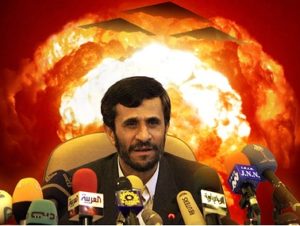 Oh wow. Has it been this long already?
Oh wow. Has it been this long already?
It turns out that I’ve been writing for TC Jewfolk for an entire year today.
And what a year it has been!
Why don’t we go back, and have another look at all the excitement the past year has held for U.S.-Israel relations.
(Follow the hyperlinks for my more detailed analysis of each of these events.)
The year kicked off with a bang right here in Minnesota, when the DFL Progressive Caucus passed a resolution to divest from Israel.
Perhaps ironically, this was closely followed by Israel etablishing the first and largest field hospital in Haiti, to aid the victims of the disasterous earthquake.
Almost at the same time, the Senate unanimously passed the Iran Sanctions Act (officially, the Comprehensive Iran Sanctions, Accountability, and Divestment Act of 2009 – S. 2799). With a similar bill having passed the House the previous December, this officially opened the door for the U.S. to implement urgently needed real sanctions on Iran, in the hope of stopping Iran’s push for nuclear weapons.
Later, Israel announced its intention to protect and revitalize 150 ancient holy sites, including 2 sites holy to both Jews and Muslims – the Tomb of the Patriarchs and Rachel’s Tomb. Inexplicably, this led to significant outcry and controversy, both from Palestinians in the region and many other voices abroad.
March kicked off with the sixth annual Israeli Apartheid Week (delighting Americans since 2002), while the Israeli parliament faced a controversial new conversion and marriage bill, driven by Israel’s elaborate coalition politics.
At the AIPAC 2010 Policy Conference, House of Representatives Majority Leader (Democrat Steny Hoyer) and Minority Whip (Republican Eric Cantor) spoke about the unwavering Congressional support for Israel.
And then, the flotilla incident came along (remember that?), along with all the nasty fallout and legal questions.
The same summer, the Presbyterian Church (U.S.A.) passed a resolution right here in Minneapolis, widely condemning Israel.
Perhaps not surprisingly, the ADL soon issued its annual report on Anti-Semitism in the U.S., showing Anti-Semitism rising to more than 3 incidents every day across the country. California, as usual, topped the list of offenders, showing an increase of 20% for the second year running.
Direct peace talks between Israel and West Bank Palestinians commenced in the fall. Unfortunately, the start of the talks was marked not so much by the spirit of dialogue, but by the specter of death, as Hamas gunmen murdered four Israelis in a terrorist shooting on the eve of the talks.
In an unusual twist, however, Egyptian President Hosni Mubarak spoke out for peace and understanding at the start of the talks, making it clear that major Arab leaders actually do understand Israel’s security needs and concerns. At least when writing in English in The New York Times.
 TIME Magazine, on the other hand, spoke out for Anti-Semitic drivel and biased, baseless reporting, accusing Israelis of “not caring about peace anymore”. I suppose they have to keep the world in balance somehow…
TIME Magazine, on the other hand, spoke out for Anti-Semitic drivel and biased, baseless reporting, accusing Israelis of “not caring about peace anymore”. I suppose they have to keep the world in balance somehow…Finally, there was a major dustup over whether it is valid for Israel to want official recognition as “The Jewish State” from the Palestinians, as part of the peace negotiations, and why recognition actually matters.
And just to close the year out with a bang, the Republican Party took control of the House of Representatives, making an outspoken, strongly pro-Israel Jewish Congressman the new Majority Leader.
So where does that leave us for 2011?
In a region as volatile as the Middle East, it would be foolish to claim we know what lies ahead. I’m sure many surprises are in store – both pleasant and not so much. But there are certain trends coming up on the horizon.
First of all, as I mentioned above, the wave of change in Congress may bring about a change for our relationship with Israel, as well. We’ll just have to wait and see what shifts result for our foreign policy over the next 2 years.
Second, despite all UN assurances and guarantees, Hamas and Hezbollah continue to amass rocket and missile arsenals. According to the recent Wikileaks releases, Hezbullah has amassed over 40,000 rockets, most of them able to hit any point in Israel, not just the far north. Hamas is now clearly able to reach Tel Aviv, and according to Chief of Staff Gabi Ashkenazi, the IDF is preparing for a major war, most likely against Hamas and Hezbollah.
Third, alongside Hamas building up its weapons arsenal, and the attendant further militarization and isolation of Gaza, we are likely to continue to see efforts toward engagement with the Palestinians in the West Bank. Decreased violence, and increased calm and economic prosperity in the West Bank, coupled with the resulting ongoing easing of restrictions on the West Bank by Israel, may lead to further and further separation between West Bank and Gaza Palestinians, and talk of a potential peace settlement with one, if not the other. An additional wrinkle we are going to see is the new move by several nations to unilaterally recognize a Palestinian state in the West Bank, but that is a larger matter for a separate column.
And finally, and perhaps most importantly, the Iranian nuclear question is still open, and I believe will continue to be a larger and more impending issue in 2011. Iran is closer than ever to its goal of attaining nuclear weapons, and is getting closer every day. Last week, it was announced that Iran has produced almost 40 kg (80 lbs) of 20% enriched uranium – a tremendous step forward toward weapons-grade uranium from their previous 5% enrichment levels. Note that Iran already has over 300 missiles that could reach Israel within 10 minutes.
Last year, we saw the House and Senate pass a serious Iran Sanctions Act. This year, we will have to see whether the government has enough backbone to actually enforce those sanctions, or whether they are just talk. And as we get closer and closer to the point of no return, we may hear more discussions of what’s the greater evil – bombing Iran or nuclear Iran.
Thank you for sticking with me for this whole year, and here’s to another year of lots and lots of change. May it be for good more than bad.
We’ll just have to wait and see.
[Images: The Moral Liberal, ambrown, Time Magazine, Wikipedia, azrainman]




